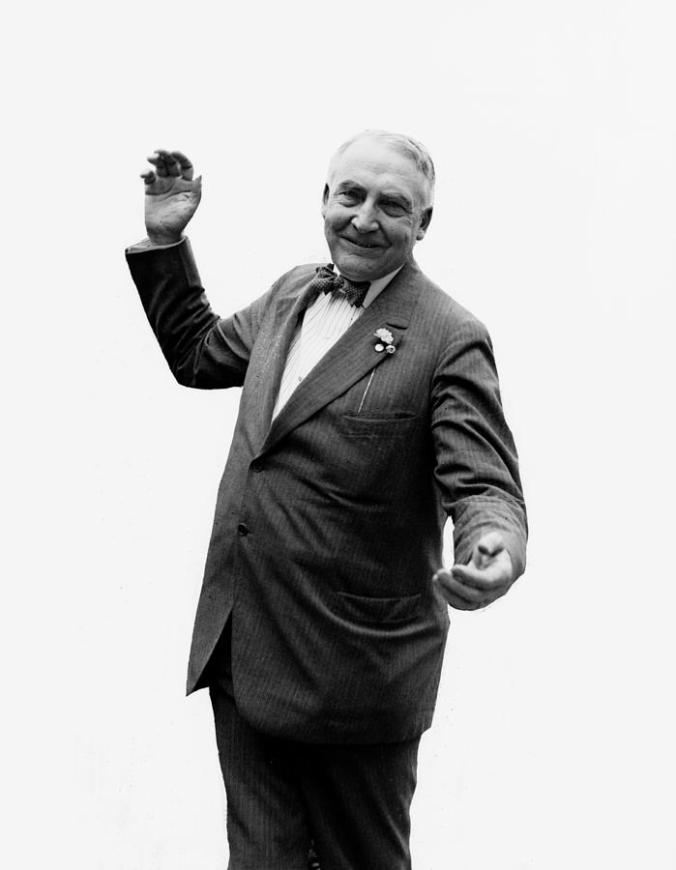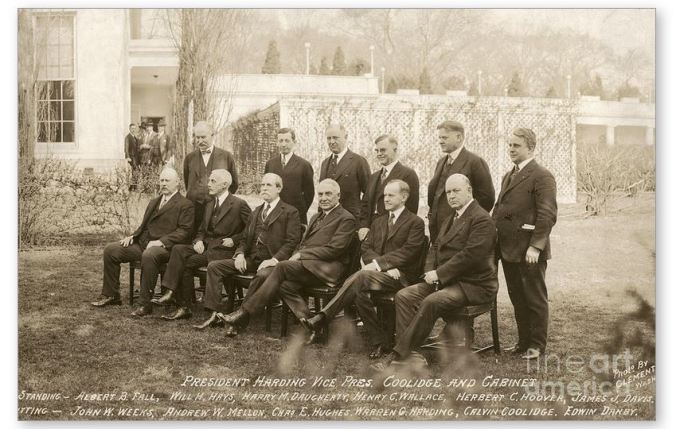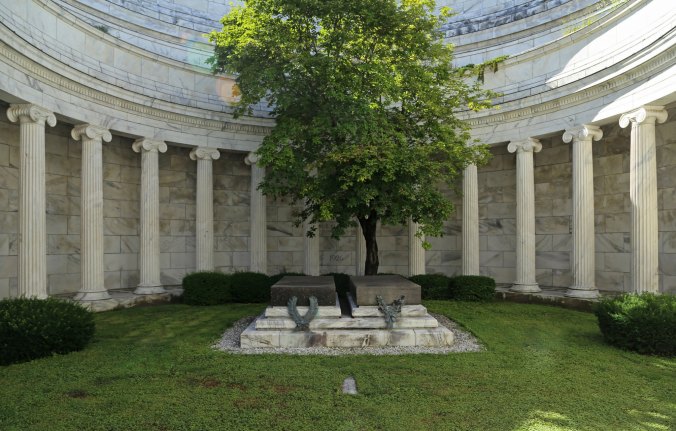
“It often has been remarked that when a particular crisis in human affairs has required a certain type of ability to meet it the right man has appeared. Whether this is because there are latent powers in all of us which give those who become charged with responsibility the ability to respond by rising above themselves, it is impossible to decide. Perhaps it is enough to know that when the world has a work to do some one appears who is able to do it.
“It seems as though President Harding was preeminently fitted to serve the country in the disturbed and distraught period following the war. He had experience and ability, courage and patience, combined with a generous toleration and cheerful optimism that inspired confidence. He had a natural gift of expression which he had developed into an art. He understood the people and the people understood him. In composing a situation, in pacifying men, he was a master.
“Those qualities which were so much needed in our country and in the world he brought to the presidential office. When he began his term our domestic situation was chaotic. Credit was over extended. Commodity prices had experienced a perpendicular decline. Unemployment was extensive. Agriculture was prostrate. The national debt was enormous. War taxes prevailed. Government expenses were heavy. All kinds of business were in distress.
“Our foreign relations were precarious. We had rejected the treaty of Versailles but we had not made peace. We were engaged in building the greatest navy in the world. The islands in the Pacific ocean were a source of friction. Europe looked on us with suspicion.

Photo credit: Fineart America
“To deal with these problems President Harding summoned the Congress and kept it in session for nearly two years. The credit stringency was relieved by reviving the War Finance Corporation. Our markets were protected by enacting emergency tariff law. Labor was protected by restricting immigration. A Budget Bureau was established and a system of rigid economy was adopted. To discharge our obligations to ex-service men the Veterans’ Bureau was organized. A new internal revenue law reduced taxes hundreds of millions of dollars annually. A permanent tariff bull gave protection to our markets in harmony with the new conditions of world trade. Surplus war materials and treasury assets were converted into cash to pay expenses and reduce debts. Several billions of short term governmental obligations were paid or refunded. The shipping business and the railroad administration were put in the way of liquidation.
“While these measures were being adopted for our domestic benefit settlements of even greater magnitude were being made in the foreign field. Peace treaties were negotiated with those with whom we had been at war. A long standing difference with Colombia was generously composed. Diplomatic relations were resumed with Mexico. A commission was appointed under authority of the Congress to negotiate a settlement of our foreign debts under which an agreement was speedily made with Great Britain.
“In spite of a universally genuine desire for peace the world was engaging in a competitive race in armaments which was a source of expense and suspicion. To relieve humanity from this increasing menace President Harding called the historic Washington conference on the limitation of armaments. A preliminary treaty was drafted for the present and future settlement of differences among the many international interests in the Pacific Ocean. The British and Japanese alliance was terminated. The five great maritime powers then entered into a solemn covenant limiting most of the different types of warships in respect to number, tonnage, and armaments. When that treaty was signed it marked an epoch in history.
“Such in barest outline are some of the policies adopted under the leadership of President Harding for the restoration of the United States and the pacification of the world. Under this benign influence trade revived and a better international understanding prevailed. He would be the last to claim all the credit for these accomplishments. He had the loyal and patriotic cooperation of public men within and without his own party. All he could do through governmental agencies was to proceed in harmony with sound economic laws which would strengthen and support the recuperative power of the people in working out their own business revival. He had the advantages, too, of the deeply interested and watchful care of a wife who was ever devoted to his welfare and shared with him his burdens. No record of his work would satisfy him which failed to recognize the helpful influence of Mrs. Harding who sleeps here by his side.

The Harding Tombs inside the Memorial dedicated in 1931. Photo credit: Christopher Riley/Flickr
“Frequently he asserted that he desired his administration to be an era of good understanding. Conflicts between the government and business he believed should be removed. Differences between capital and labor he wished to see adjusted. There was no room in his broad sympathy for any taint of sectionalism. But chiefly he was determined to use his great office to the full extent of the powers to prevent future wars. He was for good understanding among nations. His vision was broad. His statesmanship was inclusive. It would be difficult to find any peace time period of little over two years when so much that was beneficial was accomplished as during his administration” — former President Calvin Coolidge, accepting the monument to President Harding at Marion, Ohio, June 16, 1931.


